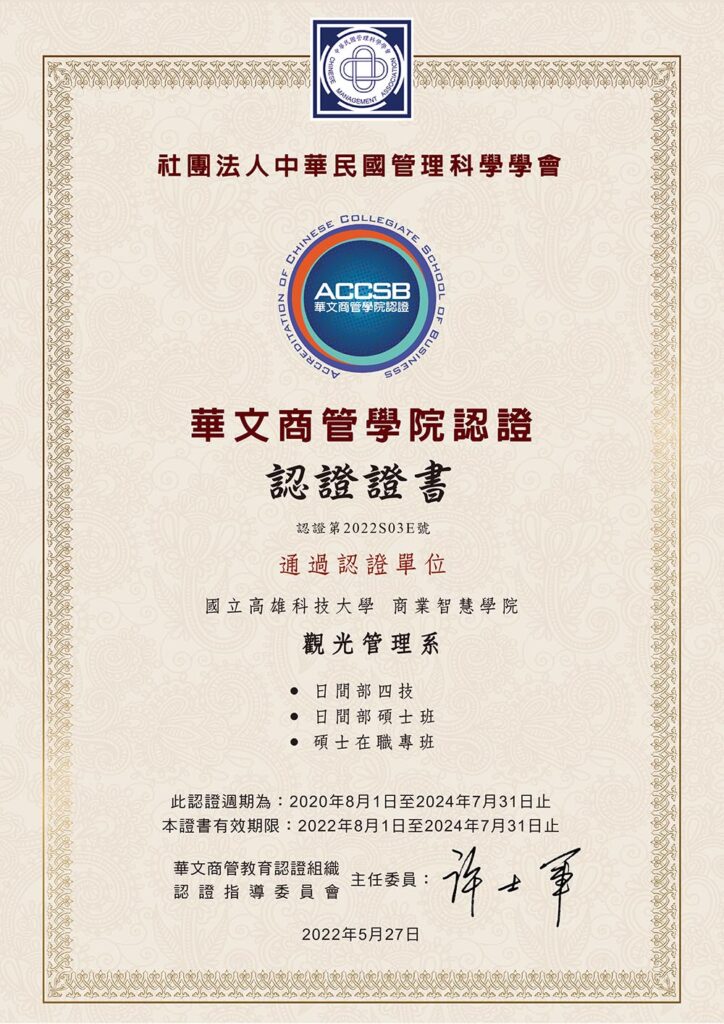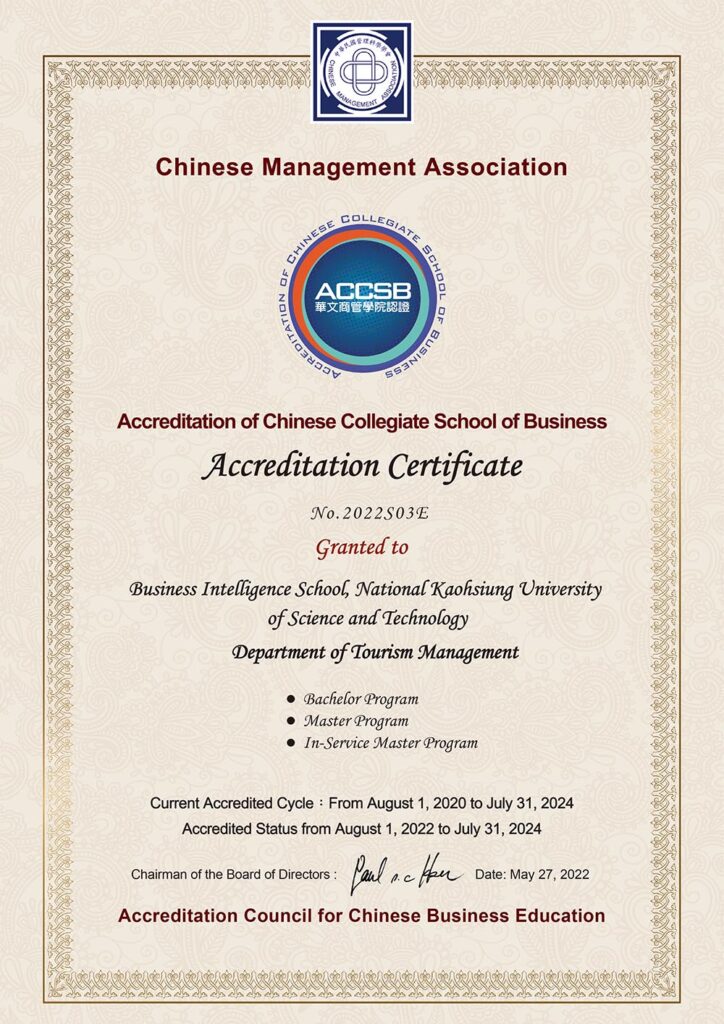About Us
- HOME
- About Us
- The Department of Tourism Management was established in 1999 as a four-year degree program to train professionals with comprehensive skills in tourism. Students enrolled in this department will acquire specialized skills through two programs: ‘Hospitality Management’ and ‘Smart Tourism’, both of which offer relevant courses.
- Tourism is a comprehensive industry that includes travel, airlines, hotels, catering, conventions and exhibitions, and other related services. In addition to the basic subjects, the Department has also strengthened its curriculum to develop students’ skills in tourism marketing planning and planning of tourism and leisure activities. This approach aims to nurture students’ ability to utilize their professional skills in a variety of contexts, including planning, development, innovation, implementation, and evaluation.
A Brief History of the Department
The Department of Tourism Management was formerly the Tourism Department of the Five-Year Junior College System at Kaohsiung Municipal College of International Business, but was merged into the University in August 1990. In order to cope with the government’s plan to change the structure of higher education, to meet the demand of senior secondary and tertiary students for further studies, and to upgrade the quality of talents in the tourism industry, the five-year tourism program of the Department of Tourism was transformed into a two-year tourism program in July 1992. In July 1992, the five-year tourism program of the Department of Tourism was changed to a two-year tourism program, with one daytime class and two evening classes. In 1997, we also opened a one-daytime class for the Extension Division of the two-year college program, all of which enrolled graduates from vocational high schools.
- In response to the evolving needs of society and the country’s development, the department was reorganized into a four-year program in 1999 and renamed the Department of Tourism Management to admit one class of the four-year day department, while the evening department continued as a two-year program and was reduced to one class at the same time.
- The School of Continuing Education was converted from a two-year program to a two-year technical college in July 2000 and the Evening Division also changed from a two-year program to a two-year technical college, both of which admitted graduates of junior colleges or vocational schools.
- To cultivate middle and senior management professionals with expertise in tourism or hospitality, raise the level of operation and research tourism and hospitality industry in Taiwan, promote academic research culture in tourism, and effectively integrate resources from industry, government, academia, and research, the Department was granted approval by the Ministry of Education to establish a master’s programme in the Institute of Tourism and Hospitality Management in July 2003.
- Just one year later, due to the low admission rate in response to the strong demand from the industry, an in-service Master’s programme was established in 2004 to meet the needs of the industry.
- The Faculty has undergone the above-mentioned changes and has finally evolved with the times. At present, the main academic structure covers the PhD programme, the Master’s programme, the Master’s in-service programme, the four-year Technical College Day Division, the four-year Technical College Further Education Division, the two year Technical College Further Education and Promotion Division, the four-year Technical College Further Education Institute and the Industry-University Collaborative Programme.
- Since August 2011, one of the seven departments of the School of Management (during the period when it was known as the National Kaohsiung University of Applied Science and Technology) has been relocated to the Yen Chao campus (the School of Continuing Education, the School of Continuing Studies and the Master’s in-service course continue to be offered on the Jian Gong campus), marking another milestone in the development of the department.
- There is plenty of space on the Yen Chao campus. The department has seven classrooms on the 1st floor, including a bartending classroom, a coffee classroom, a food service classroom, a baking classroom, a western food classroom and a Chinese classroom. On the 2nd floor, there is a computer classroom, a coffee classroom and three general classrooms. On the 6th floor, there are the Head of Department’s office, the Department’s office, two postgraduate classrooms, two postgraduate study rooms, a library and information room, a tourism classroom, and 12 teachers’ study rooms. The total investment is $15 million for the purchase of various practical equipment and facilities.
- In addition, a total of three practical rooms have been planned in the hostel building to further enhance the professional facilities and strengthen the department’s position as a leading provider of tourism and hospitality education.
In February 2018, the National Kaohsiung University of Science and Technology (NKUST) was established by merging the National Kaohsiung University of Science and Technology, the National Kaohsiung University of Science and Technology and the National Kaohsiung Marine University.
In the 2019 academic year, the National Kaohsiung University of Science and Technology (NKUST) is committed to promoting the digital transformation of its campus in response to the global trend of business technology, with the approval of the Ministry of Education. The School of Management at the National Kaohsiung University of Science and Technology (NKUST), formerly part of the Department of Tourism Management, has been renamed the Business Intelligence School at NKUST. The School of Business Intelligence at NKUST aims to transform the traditional approach to business education and to actively nurture internationally trendy and competitive business intelligence professionals. In the 2020 academic year, the Business Intelligence School has been approved by the Ministry of Education to enroll in the Doctoral Program B (Tourism and Hospitality Management).
Educational Objectives
- To train middle and senior management staff with expertise in tourism or hospitality.
- To nurture innovative and visionary managers who are independent thinkers, trained in humanities and technology.
- To nurture professional management personnel with a sustainable development mindset, a concern for local industries, and an international outlook and competitiveness.
- To strengthen students’ skills in the implementation and evaluation of marketing and tourism activities.
- To develop students’ knowledge in the use of relevant information systems and technology, and to develop their English and Japanese language skills.
Features of the Department
- The professional disciplines are divided into two groups, namely the “Hospitality Management Programme” and the “Smart Tourism Programme”, which aim to strengthen the ability to plan and execute marketing and leisure activities in the tourism and hospitality industries.
- The programme focuses on industry-academia linkages, and is designed for a variety of industry-academia exchange mechanisms such as off-campus placements, overseas placements, industry mentors and industry-academia collaboration programmes.
- The programme emphasises the development of language skills and an international outlook, and offers a wide range of opportunities for overseas study tours and research, double cohort programmes and student exchanges.
- The Alumni Association is well organised and has accomplished members in all areas of the tourism profession, providing solid support for our graduates.
教學評鑑認證資訊

ACCSB華文商管學院認證週期:2020年08月01日至2024年07月31日止


建工辦公室 聯絡資訊:
系辦電話:07-381-4526 轉 17201或17214
系辦傳真:07-3810635
807高雄市三民區建工路415號(建工校區)
辦公時間:(建工校區)
每週一至週五 13:30 p.m-21:50 p.m
燕巢辦公室 聯絡資訊:
系辦電話:07-381-4526 轉 17231~17237
系辦傳真:07-6152231
824高雄市燕巢區深中路58號(燕巢校區)
辦公時間:(燕巢校區)
每週一至週五 08:00 a.m-17:30 p.m
